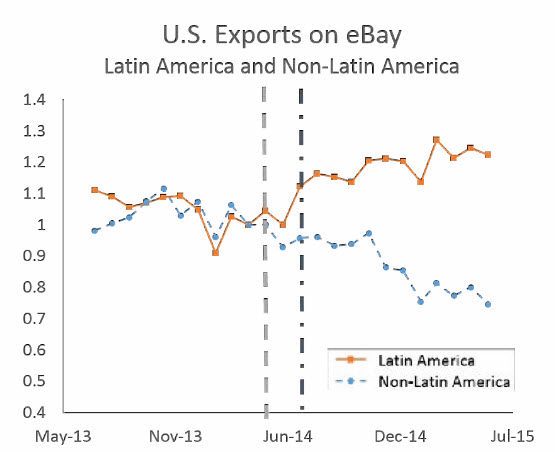
Machine translation using machine learning is free, but many services with high accuracy are provided. It is helpful in various ways when reading foreign papers and websites, or when interacting with foreigners. Machine translation is also playing an important role in the economy. The National Bureau of Economic Research (NBER) reported how the sales of eBay, an Internet auction site, have changed since the introduction of machine translation.
Machine translation eMT equipped with eBay’s own machine learning system supports product sales by translating product features that are not written in the buyer’s native language in an easy-to-understand manner. The eMT machine learning model learns translations by learning both from data created by eBay and automatically collected from the web, and operates in real time to realize high-quality translations in seconds.
Some of the eMT functions translate buyer search terms and product titles in parallel. For example, when a buyer enters a Spanish keyword in the search bar, the eMT Spanish query is quickly translated into English and the search results are displayed in Spanish on the page according to the relevance of the translated query to the English product name. In Spanish-speaking Latin America, buyers can have a localized website, as if they were visiting a Spanish website, searching in Spanish, and displaying Spanish titles in the search results.
eBay has been offering eMT in Russia, Latin America, and the EU since around 2014. The research team focused on eMT to support Spanish translation in Latin America and investigated how exports changed before and after eMT was introduced.

If you look at the trend of US exports before and after the introduction of machine translation for Spanish on eBay, it is said that exports to Latin America increased by an average of 20% after the introduction of machine translation. Looking at the increase in exports by sector, looking at the data from six months before the introduction of Spanish machine translation and six months after the introduction of Spanish machine translation, in the order of the largest increase in exports by sector, professional services, money, dolls, cameras and photos, babies, clothes, shoes, and accessories are in order. The categories for which export volume increased may seem inconsistent, but the research team estimates that the more inexpensive goods or items in a category, the more likely it is that the number of exports of these categories has increased because more people are exploring it. It is also said that the export growth rate was greater for products with many words in the title. It is said that the export growth rate for products with 13 words or less was 6-10% lower than for products with at least 20 words in the title.

The research team says these results have two implications. First, language barriers greatly impede trade. Second, AI is already influencing productivity and trade, and has the potential to boost each. In addition to machine translation, AI applications are also emerging in other fields. Various applications by AI, such as voice recognition, medical diagnosis, and customer support, are being provided. As reviewed in this paper as having an online impact, the new system will provide new opportunities to evaluate the economic impact of AI through natural experimentation. Related information can be found here.


















Add comment